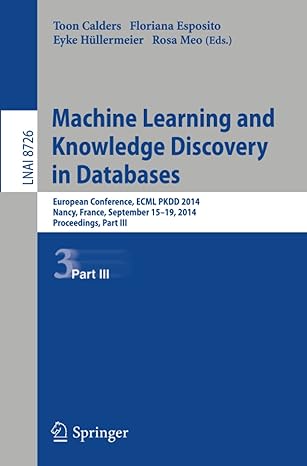Question
# The puzzle game 'Wordle'! # Basic idea: # the game loads in a set of 'known words' from a file or an array. #
# The puzzle game 'Wordle'!
# Basic idea:
# the game loads in a set of 'known words' from a file or an array.
# All 'known words' must have the same length (e.g., 5 characters)
# When the game starts, a secret word is chosen from the list of known words.
# The player can then issue guesses.
# Each guess returns a Hint object instance that tells:
# - which characters in the guess are correct, and correctly located.
# - which characters in the guess are in the secret word, but not at the location guessed
# - which characters in the guess are not in the secret word
# If all characters in the guess are correctly located, the game is won ;)
import random
from Hint import Hint
class Wordle(object):
"""docstring for Wordle"""
def __init__(self, file=None, wordList=[], length=0, minFreq=-1, maxFreq=-1):
pass
def numberOfKnownWords(self):
pass
# _Part 2: Implement this method._
# Load words from a file. Each line of the file contains a word followed by one or more spaces followed
# by a number whose value is higher for words that are more 'frequently occurring' than others.
# Loaded words should have a frequency value in the range [minfreq, maxfreq]. However, at times, these
# limits should be ignored (see comments below). Note that the words in the file may be many lengths
# (e.g., 3-10 characters). Only words of the specified length should be loaded.
# Hint: use a Scanner instance to read in the file and look for the next String or Long value.
# the following pattern will be useful ;)
# Scanner scan = new Scanner(new File(filenm));
# The line above creates a Scanner from a File with the filename stored in the variable filenm
# Use the scanner's .hasNext() method to test if there are more lines to read.
# Use the scanner's .next() method to grab the next String token (word).
# The scanner's .nextLong() method will grab the next token as a number (use this to read the frequency).
# For each line, you will want to call scan.next() and scan.nextLong() to read the data
# identifying a word and its relative frequency.
# Words of the specified length should be added into the knownWords list if their frequencies
# are the in the range specified.
# Hint: somewhere around 10-20 lines is probably appropriate here unless you have a lot of comments
# @param filenm - the file name to load from
# @param length - the length of words we want to load (e.g., 5 to load 5 character words)
# @param minfreq - the minimum allowable frequency for a loaded word
# @param maxfreq - the maximum allowable frequenct for a loaded word; 0 indicates no maximum
def loadWords(self, file, length, minFreq, maxFreq):
pass
# _Part 3: Implement this method._
# Obtain a list of known words. This method creates a new copy of the known words list.
# Here, you simply need to copy the knownWords list and return that copy.
# @return a new copy of list of known words.
def getKnownWords(self):
pass
# Prepare the game for playing by choosing a new secret word.
def initGame(self):
pass
# Supply a guess and get a hint!
# Note that this implementation DOES NOT require that the guess be selected
# from the known words. Rather, this implementation allows one to guess arbitrary
# characters, so long as the guess is the same length as the secret word.
# @param g - the guess (a string which is the same length as the secret word)
# @return a hint indicating the letters guessed correctly/incorrectly
# @returns None if the guess is not the same length as the secret word
def guess(self, g):
pass
Step by Step Solution
There are 3 Steps involved in it
Step: 1

Get Instant Access to Expert-Tailored Solutions
See step-by-step solutions with expert insights and AI powered tools for academic success
Step: 2

Step: 3

Ace Your Homework with AI
Get the answers you need in no time with our AI-driven, step-by-step assistance
Get Started


